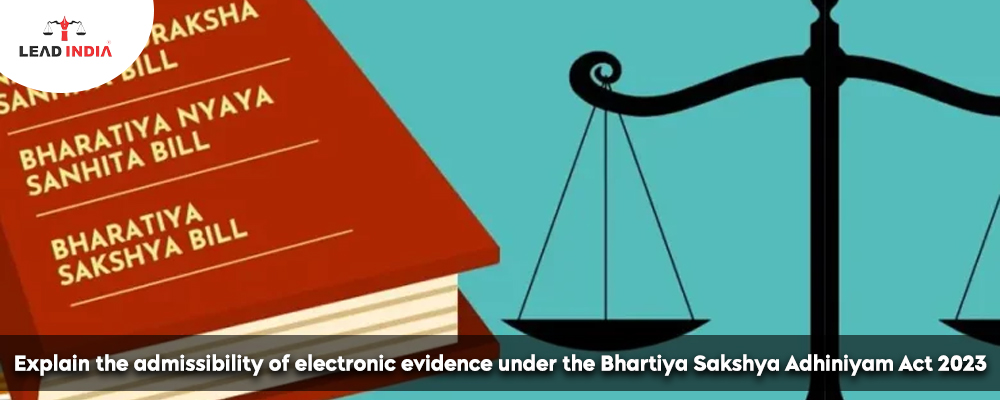Electronic evidence, which ranges from emails and text messages to social media posts and security films, gives a detailed and often unassailable record of occurrences. This transition has expedited the investigation process and created new obstacles to the authenticity, preservation, and interpretation of electronic evidence. As technology advances, the legal system must modify its frameworks to facilitate the fair and just treatment of electronic evidence in courtrooms worldwide.
The Indian Evidence Act, of 1872 (“IEA”) included provisions for the recognition and admissibility of ‘electronic recordings’. Section 65B of the IEA determined the admissibility of electronic records. There was no standard structure for drafting a certificate under Section 65B of the IEA.
Need A Legal Advice
The internet is not a lawyer and neither are you. Talk to a real lawyer about your legal issue

Admissibility of electronic evidence under Bhartiya Sakshya Adhiniyam Act 2023
- The admission of electronic documents is governed by Section 63 of The Bhartiya Sakshya Adhiniyam, 2023 (“BSA”), and the requirements required for their admissibility remain nearly identical to the IEA (save for the addition of the words ‘and an expert’). However, the most significant alteration and addition to the BSA is the inclusion of a structure for the Certificate under Section 63 of the BSA in the Schedule. Part A and Part B of the Certificate are separate sections. Part A must be completed by the party responsible for creating such electronic records, while Part B must be completed by an expert.
- The BSA makes electronic evidence admissible and grants the Court the authority to consult an Examiner of Electronic Evidence to obtain an opinion on such evidence.
- The BSA defines documents to include electronic records. It keeps the IEA condition that all papers must be admissible as primary evidence unless they qualify as secondary evidence (original destroyed or with the person against whom the document must be established).
- Documentary evidence comprises information in electronic records that have been printed or saved on optical or magnetic media created by a computer. Such data could have been stored or handled by multiple machines. The BSB states that electronic or digital records will have the same legal effect as paper records. It broadens electronic records to encompass information stored in semiconductor memory or any communication device (smartphones, laptops). This will also contain email records, server logs, smartphone data, locational proof, and voicemail.
The BSB defines documents to include electronic records. It keeps the IEA rule that all papers must be admissible as primary evidence unless they qualify as secondary evidence (the original has been destroyed or is with the person against whom the document must be proved). It does, however, retain the stipulation that all electronic records must be certified and authenticated before they can be used as documentation. This takes precedence over other provisions. These modifications may cause misunderstanding regarding the admission of electronic records.
The Standing Committee on Home Affairs (2023) noted that the BSB requires electronic records to be proven by primary evidence while preserving the part of electronic record admissibility through certificate authentication. It advocated using a certificate to prove electronic records in compliance with the section on electronic records’ admission.
The legislature has made a significant step forward from previous law by implementing a technologically advanced requirement for the acceptance of electronic documents. However, a doubt hangs over the requirement for an ‘expert’ outlined in Part-B of the Certificate under Section 63 of the BSA. This is likely to be clarified, either through later-enacted rules or by tasking the judiciary with interpreting the same and selecting the most constructive interpretation, which not only protects the reliability of electronic records as evidence but also ensures that the requirements are not too burdensome for the average person to meet.
Lead India provides free legal advice, internet information, and other legal services. We offer a forum where you may talk with a lawyer and ask legal questions. Lead India’s Lawyers may assist you with any legal matters. Lead India’s solicitors can help you with any legal concerns. Lead India also offers free online legal help in India. In addition to providing online legal aid, Lead India allows users to ask specialist inquiries for free.





 Talk to a Lawyer
Talk to a Lawyer